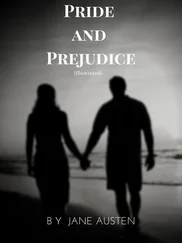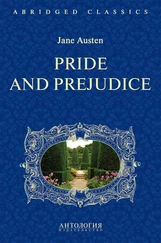Jane Austin - Pride and Prejudice
Здесь есть возможность читать онлайн «Jane Austin - Pride and Prejudice» — ознакомительный отрывок электронной книги совершенно бесплатно, а после прочтения отрывка купить полную версию. В некоторых случаях можно слушать аудио, скачать через торрент в формате fb2 и присутствует краткое содержание. Жанр: unrecognised, на немецком языке. Описание произведения, (предисловие) а так же отзывы посетителей доступны на портале библиотеки ЛибКат.
- Название:Pride and Prejudice
- Автор:
- Жанр:
- Год:неизвестен
- ISBN:нет данных
- Рейтинг книги:3 / 5. Голосов: 1
-
Избранное:Добавить в избранное
- Отзывы:
-
Ваша оценка:
- 60
- 1
- 2
- 3
- 4
- 5
Pride and Prejudice: краткое содержание, описание и аннотация
Предлагаем к чтению аннотацию, описание, краткое содержание или предисловие (зависит от того, что написал сам автор книги «Pride and Prejudice»). Если вы не нашли необходимую информацию о книге — напишите в комментариях, мы постараемся отыскать её.
Pride and Prejudice — читать онлайн ознакомительный отрывок
Ниже представлен текст книги, разбитый по страницам. Система сохранения места последней прочитанной страницы, позволяет с удобством читать онлайн бесплатно книгу «Pride and Prejudice», без необходимости каждый раз заново искать на чём Вы остановились. Поставьте закладку, и сможете в любой момент перейти на страницу, на которой закончили чтение.
Интервал:
Закладка:
way imaginable. He leaves out half his words, and blots the
rest.”
“My ideas flow so rapidly that I have not time to express them—by
which means my letters sometimes convey no ideas at all to my
correspondents.”
“Your humility, Mr. Bingley,” said Elizabeth, “must disarm
reproof.”
“Nothing is more deceitful,” said Darcy, “than the appearance of
humility. It is often only carelessness of opinion, and sometimes
an indirect boast.”
“And which of the two do you call _my_ little recent piece of
modesty?”
“The indirect boast; for you are really proud of your defects in
writing, because you consider them as proceeding from a rapidity
of thought and carelessness of execution, which, if not
estimable, you think at least highly interesting. The power of
doing anything with quickness is always prized much by the
possessor, and often without any attention to the imperfection of
the performance. When you told Mrs. Bennet this morning that if
you ever resolved upon quitting Netherfield you should be gone in
five minutes, you meant it to be a sort of panegyric, of
compliment to yourself—and yet what is there so very laudable in
a precipitance which must leave very necessary business undone,
and can be of no real advantage to yourself or anyone else?”
“Nay,” cried Bingley, “this is too much, to remember at night all
the foolish things that were said in the morning. And yet, upon
my honour, I believe what I said of myself to be true, and I
believe it at this moment. At least, therefore, I did not assume
the character of needless precipitance merely to show off before
the ladies.”
“I dare say you believed it; but I am by no means convinced that
you would be gone with such celerity. Your conduct would be quite
as dependent on chance as that of any man I know; and if, as you
were mounting your horse, a friend were to say, ‘Bingley, you had
better stay till next week,’ you would probably do it, you would
probably not go—and at another word, might stay a month.”
“You have only proved by this,” cried Elizabeth, “that Mr.
Bingley did not do justice to his own disposition. You have shown
him off now much more than he did himself.”
“I am exceedingly gratified,” said Bingley, “by your converting
what my friend says into a compliment on the sweetness of my
temper. But I am afraid you are giving it a turn which that
gentleman did by no means intend; for he would certainly think
better of me, if under such a circumstance I were to give a flat
denial, and ride off as fast as I could.”
“Would Mr. Darcy then consider the rashness of your original
intentions as atoned for by your obstinacy in adhering to it?”
“Upon my word, I cannot exactly explain the matter; Darcy must
speak for himself.”
“You expect me to account for opinions which you choose to call
mine, but which I have never acknowledged. Allowing the case,
however, to stand according to your representation, you must
remember, Miss Bennet, that the friend who is supposed to desire
his return to the house, and the delay of his plan, has merely
desired it, asked it without offering one argument in favour of
its propriety.”
“To yield readily—easily—to the _persuasion_ of a friend is no
merit with you.”
“To yield without conviction is no compliment to the
understanding of either.”
“You appear to me, Mr. Darcy, to allow nothing for the influence
of friendship and affection. A regard for the requester would
often make one readily yield to a request, without waiting for
arguments to reason one into it. I am not particularly speaking
of such a case as you have supposed about Mr. Bingley. We may as
well wait, perhaps, till the circumstance occurs before we
discuss the discretion of his behaviour thereupon. But in general
and ordinary cases between friend and friend, where one of them
is desired by the other to change a resolution of no very great
moment, should you think ill of that person for complying with
the desire, without waiting to be argued into it?”
“Will it not be advisable, before we proceed on this subject, to
arrange with rather more precision the degree of importance which
is to appertain to this request, as well as the degree of
intimacy subsisting between the parties?”
“By all means,” cried Bingley; “let us hear all the particulars,
not forgetting their comparative height and size; for that will
have more weight in the argument, Miss Bennet, than you may be
aware of. I assure you, that if Darcy were not such a great tall
fellow, in comparison with myself, I should not pay him half so
much deference. I declare I do not know a more awful object than
Darcy, on particular occasions, and in particular places; at his
own house especially, and of a Sunday evening, when he has
nothing to do.”
Mr. Darcy smiled; but Elizabeth thought she could perceive that
he was rather offended, and therefore checked her laugh. Miss
Bingley warmly resented the indignity he had received, in an
expostulation with her brother for talking such nonsense.
“I see your design, Bingley,” said his friend. “You dislike an
argument, and want to silence this.”
“Perhaps I do. Arguments are too much like disputes. If you and
Miss Bennet will defer yours till I am out of the room, I shall
be very thankful; and then you may say whatever you like of me.”
“What you ask,” said Elizabeth, “is no sacrifice on my side; and
Mr. Darcy had much better finish his letter.”
Mr. Darcy took her advice, and did finish his letter.
When that business was over, he applied to Miss Bingley and
Elizabeth for an indulgence of some music. Miss Bingley moved
with some alacrity to the pianoforte; and, after a polite request
that Elizabeth would lead the way which the other as politely and
more earnestly negatived, she seated herself.
Mrs. Hurst sang with her sister, and while they were thus
employed, Elizabeth could not help observing, as she turned over
some music-books that lay on the instrument, how frequently Mr.
Darcy’s eyes were fixed on her. She hardly knew how to suppose
that she could be an object of admiration to so great a man; and
yet that he should look at her because he disliked her, was still
more strange. She could only imagine, however, at last that she
drew his notice because there was something more wrong and
reprehensible, according to his ideas of right, than in any other
person present. The supposition did not pain her. She liked him
too little to care for his approbation.
After playing some Italian songs, Miss Bingley varied the charm
by a lively Scotch air; and soon afterwards Mr. Darcy, drawing
near Elizabeth, said to her:
“Do not you feel a great inclination, Miss Bennet, to seize such
an opportunity of dancing a reel?”
She smiled, but made no answer. He repeated the question, with
some surprise at her silence.
“Oh!” said she, “I heard you before, but I could not immediately
determine what to say in reply. You wanted me, I know, to say
‘Yes,’ that you might have the pleasure of despising my taste;
but I always delight in overthrowing those kind of schemes, and
cheating a person of their premeditated contempt. I have,
therefore, made up my mind to tell you, that I do not want to
dance a reel at all—and now despise me if you dare.”
Читать дальшеИнтервал:
Закладка:
Похожие книги на «Pride and Prejudice»
Представляем Вашему вниманию похожие книги на «Pride and Prejudice» списком для выбора. Мы отобрали схожую по названию и смыслу литературу в надежде предоставить читателям больше вариантов отыскать новые, интересные, ещё непрочитанные произведения.
Обсуждение, отзывы о книге «Pride and Prejudice» и просто собственные мнения читателей. Оставьте ваши комментарии, напишите, что Вы думаете о произведении, его смысле или главных героях. Укажите что конкретно понравилось, а что нет, и почему Вы так считаете.












